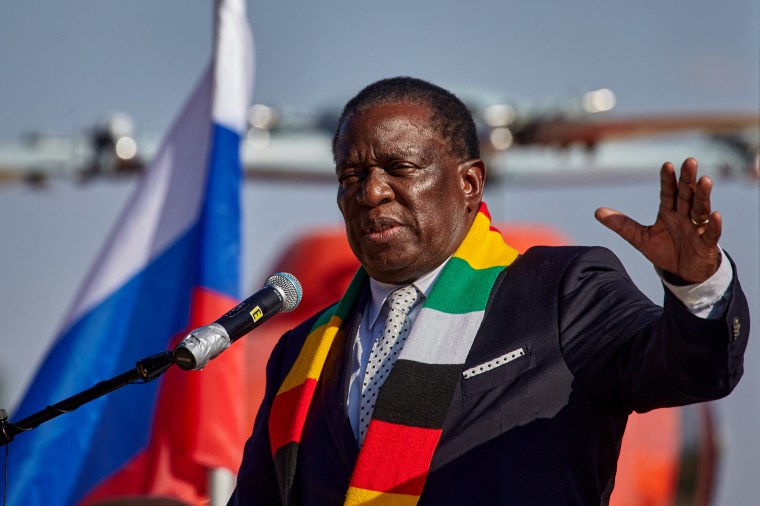Lusaka, July 3, 2023—Zimbabwe President Emmerson Mnangagwa should not sign into law the overly broad Criminal Law (Codification and Reform) Amendment Bill as it seriously threatens the rights to freedom of expression and media freedom in Zimbabwe, the Committee to Protect Journalists said Monday.
On June 7, Zimbabwe’s upper chamber of parliament approved the bill, commonly called the “Patriot Bill,” following the lower chamber’s approval on May 31. President Mnangagwa is expected to sign into law the bill, which opponents say criminalizes criticism, ahead of the country’s general elections in August.
The bill would criminalize “willfully injuring the sovereignty and national interest of Zimbabwe.” That would include any meeting or communication between a Zimbabwean citizen or permanent resident and foreign governments or their agents with the aim of “subverting, upsetting, overthrowing or overturning the government,” for which the penalty is 20 years imprisonment.
Njabulo Ncube, director of the industry trade group Zimbabwe National Editors Forum (ZINEF), told CPJ via messaging app that he feared journalists could risk arrest or imprisonment for meeting with foreign missions sent to observe and monitor the August 23 general elections.
“They will ask us to give the state of the situation in Zimbabwe, and once we speak, they may deem that to be unpatriotic, and they may want to invoke provisions of this bad law,” Ncube said. “Since it’s so vague, they can find anything to use to charge the journalists.”
“Zimbabwean President Emmerson Mnangagwa must not sign the unconstitutional and poorly drafted ‘Patriot Bill’ into law and should focus instead on ensuring a safe environment for free and fair elections to be held in August,” said Angela Quintal, CPJ’s Africa program coordinator, in New York. “Journalists must have the right to report freely and meet whomever they choose to, including foreign diplomats, without running the risk of imprisonment and a criminal record because a government functionary deems such discussions unpatriotic or subversive in terms of the proposed law.”
The bill would also criminalize participating in a meeting called by an agent of a foreign government whose objective may be deemed to “consider or plan an armed intervention,” the penalty for which can include life imprisonment or death.
If an individual is found guilty of trying “to consider, implement or extend sanctions or trade boycott against Zimbabwe, its officials, or residents,” they could face up to 10 years imprisonment, a fine of 200,000 dollars (US$552), or both.
Minister of Information Monica Mutsvangwa told CPJ via messaging app that the bill did not criminalize journalists’ work in Zimbabwe but barred meetings with foreign governments and their agents that have “the intention to injure the sovereignty and the national interest of Zimbabwe.”
“I therefore urge members of the public and journalists in particular, to seek beforehand, full knowledge of meetings they intend to attend so that they are not found on the wrong side of the law,” Mutsvangwa said.
Dumisani Muleya, managing editor of the privately owned website NewsHawks, told CPJ via messaging app that he believed the bill was aimed at silencing citizens and journalists, and he feared that mere interviews with experts or foreign diplomats could get journalists arrested and imprisoned under the proposed law.
“If I’m doing an interview that is asking questions that are inviting unfavorable answers, does that constitute a crime?” Muleya asked.
Mswathi Hlongwane, secretary-general of the Zimbabwe Union of Journalists, told CPJ via messaging app that the bill’s vagueness meant provisions were open to misinterpretation and abuse by “whoever holds power” and local journalists could be convicted for doing their reporting, as it involves meeting with many people—foreign and local—whose information is relevant to the public interest.
In a letter sent in late June to President Mnangagwa, Ourveena Geereesha Topsy-Sonoo, the African Commission on Human and Peoples’ Rights special rapporteur on Freedom of Expression and Access to Information, warned that the proposed law would have far-reaching consequences on media and other fundamental freedoms.
CPJ’s calls and questions sent via messaging app to presidential spokesperson George Charamba and Mike Bihima, the ruling ZANU PF party spokesperson, went unanswered.
Editor’s note: The 12th paragraph of this report has been updated to correct the name of the interviewee quoted.
